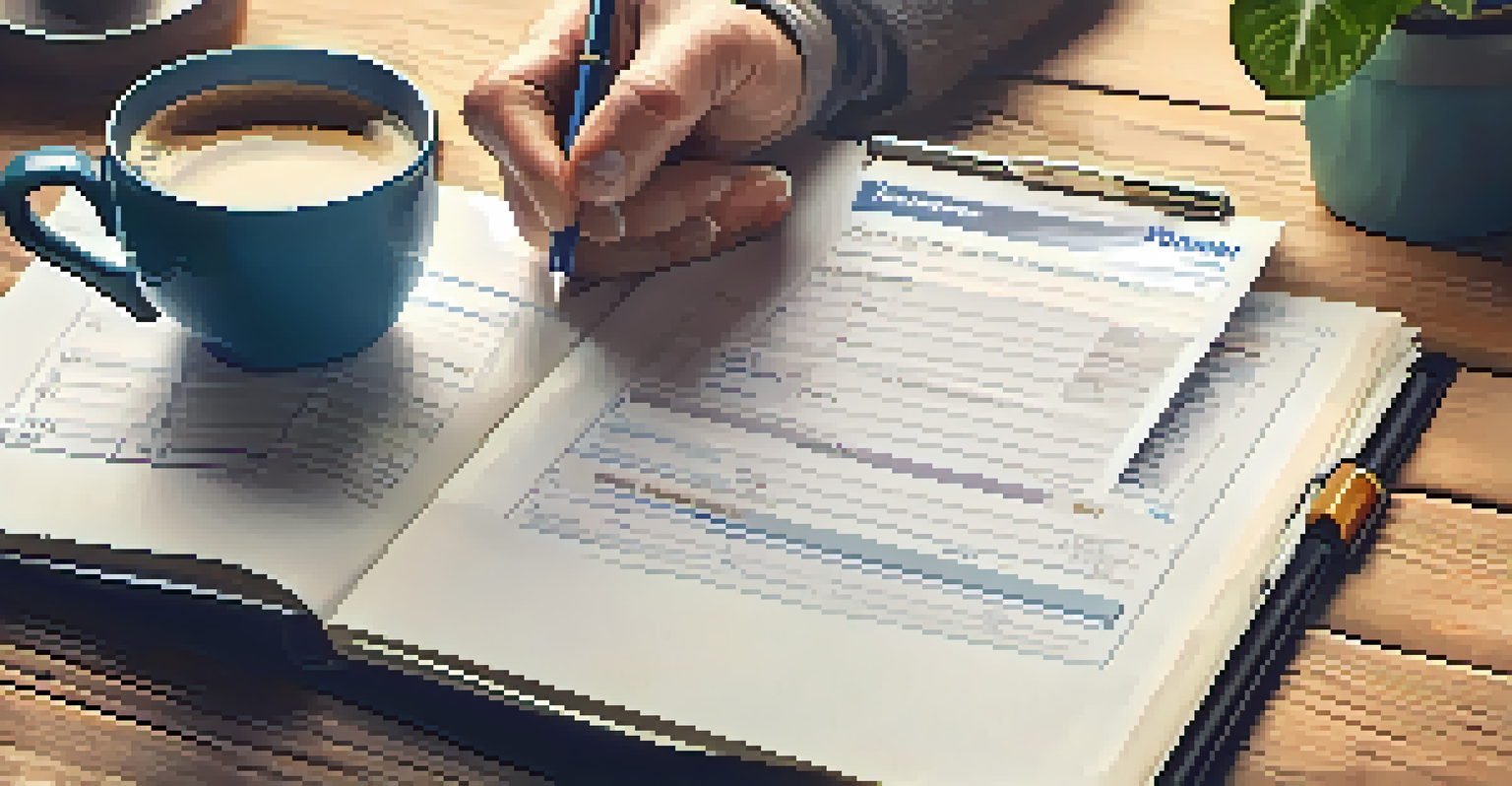How to Create a Retirement Budget for Effective Income Planning

Understanding the Importance of a Retirement Budget
Creating a retirement budget is crucial for ensuring that you have enough money to live comfortably after you stop working. It helps you to visualize your expected income and expenses during retirement, making it easier to manage your finances. Think of it as a roadmap to your financial future—without it, you might end up lost or taking wrong turns.
A budget is telling your money where to go instead of wondering where it went.
Retirement can last for decades, so it’s important to plan accordingly. A well-structured budget allows you to anticipate your needs, from healthcare to leisure activities, ensuring that you can enjoy this phase of life without financial stress. Just like planning for a long road trip, having a budget helps you avoid running out of gas before reaching your destination.
Moreover, a retirement budget can help you identify potential gaps in your income and expenses. This proactive approach allows you to make adjustments now, rather than facing unexpected challenges later. In essence, it's about taking control of your financial journey.
Assessing Your Current Financial Situation
Before diving into budgeting, it's essential to take a close look at your current financial situation. This means gathering all relevant documents, such as bank statements, investment accounts, and any other income sources. By laying everything out, you can get a clear picture of where you stand financially, much like checking your inventory before planning a big meal.

Identify your assets and liabilities to understand your net worth. This will help you determine how much money you have available for retirement and what you might need to save in the coming years. Just as you wouldn’t plan a party without knowing how many guests you have, you shouldn’t plan your retirement without knowing your financial landscape.
Importance of a Retirement Budget
A well-structured retirement budget acts as a roadmap, helping you visualize income and expenses to avoid financial stress.
Finally, consider your lifestyle choices and how they might change during retirement. Will you downsize your home, travel more, or take up new hobbies? Understanding these factors is vital to creating a realistic budget that reflects your future lifestyle.
Estimating Your Retirement Income Sources
Next, you'll want to estimate your income sources during retirement. Common sources include Social Security, pensions, and personal savings or investments. It’s like putting together a playlist—each source adds a different flavor to your overall financial mix.
It's not about how much money you make, but how much money you keep, how hard it works for you, and how many generations you keep it for.
Don’t forget about any part-time work you might consider during retirement. Many retirees find fulfillment and additional income by pursuing hobbies or freelance work. This not only adds to your income but can also keep you socially engaged and active.
Remember, it’s crucial to be realistic about these income estimates. While it’s tempting to overestimate your Social Security benefits or other income, a conservative approach will help you avoid disappointment down the line. Think of it as setting aside some extra snacks for a road trip—you never know when you might need them!
Calculating Your Expected Retirement Expenses
Understanding your expenses is just as important as knowing your income. Start by listing essential expenses like housing, utilities, groceries, and healthcare. It’s similar to budgeting for a big event—prioritize the essentials first, then add in the extras if you have room.
Next, consider discretionary expenses such as travel, entertainment, and hobbies. While these might not be necessary for survival, they can greatly enhance your quality of life during retirement. Think of it as planning the fun activities after you've taken care of the essentials.
Assess Your Financial Situation
Understanding your current financial landscape is essential for creating a realistic retirement budget that meets your future needs.
Lastly, don’t forget to factor in unexpected costs, such as medical emergencies or home repairs. Having a cushion for these surprises can save you from financial stress. It's like packing an umbrella for a trip—you might not need it, but it’s better to be prepared.
Creating Your Retirement Budget Framework
Now it's time to put everything together into a cohesive budget framework. Start by comparing your estimated income against your expected expenses to see if they align. If your expenses exceed your income, you’ll need to make some adjustments—think of it as balancing a scale.
Consider using budgeting tools or apps to help you visualize your financial situation. These tools can simplify the process and make it easier to track your spending and savings goals. Just as a GPS guides you during travel, these tools can help you stay on the right financial track.
Lastly, remember that your budget should be a living document. As your needs and circumstances change, so should your budget. Regularly revisiting and adjusting it will keep you on course and help maintain your financial health during retirement.
Strategies for Adjusting Your Budget Over Time
As life unfolds, so will your financial needs during retirement. It's essential to revisit your budget periodically—perhaps annually or after significant life changes. This practice is akin to tuning a musical instrument; it ensures everything remains harmonious as circumstances evolve.
When reviewing your budget, look for areas where you can cut back or reallocate funds. For instance, if you discover you’re spending less on travel than anticipated, consider redirecting those funds to healthcare or hobbies. Flexibility is key, just like adjusting a recipe based on what’s in your pantry.
Emergency Funds Are Crucial
Building an emergency fund provides a safety net for unexpected expenses, preserving your retirement savings for long-term stability.
Moreover, don’t hesitate to seek professional advice if you find yourself uncertain about making adjustments. Financial advisors can offer insights tailored to your unique situation, helping you navigate any complexities with ease. It’s always wise to have a co-pilot on a long journey.
The Role of Emergency Funds in Retirement Planning
An emergency fund is your financial safety net, and its importance cannot be overstated, especially during retirement. This fund should ideally cover three to six months of living expenses, providing you with peace of mind against unexpected costs. Think of it as a cushion that makes landing a bit softer when life throws a curveball.
Having an emergency fund allows you to avoid dipping into your retirement savings for unforeseen expenses. This practice helps preserve your nest egg, ensuring it lasts throughout your retirement years. Just like having a backup plan for a rainy day, it can make all the difference in maintaining your financial stability.

Lastly, if you find that your emergency fund is lacking, consider ways to build it up gradually. Even small contributions can add up over time. Remember, every little bit counts, and your future self will thank you for the foresight.